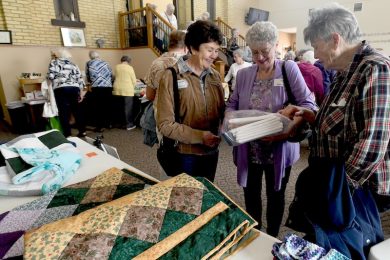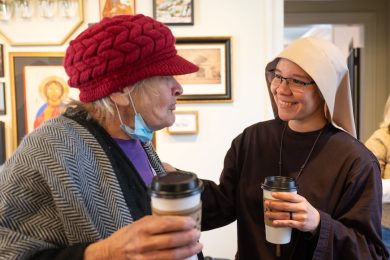The following first appeared in The Catholic Spirit, official newspaper of the Archdiocese of St. Paul and Minneapolis.
As the Minnesota Legislature prepares to open the second half of its 2023-2024 legislative session Feb. 12 at the Minnesota State Capitol in St. Paul, Jason Adkins, executive director and general counsel of the Minnesota Catholic Conference (MCC), and Maggee Hangge, MCC’s policy and public relations associate discuss key issues facing lawmakers and the people they represent.
Urging people to support legislation that helps individuals and families and to contest bills that are detrimental to the common good and contrary to Church teaching, Adkins and Hangge addressed physician-assisted suicide, mandating health insurance coverage for in-vitro fertilization procedures, as well as the legalization of sports gambling. Questions and their responses have been edited for clarity and brevity.
Q) Could you start us off with what you do at the conference and what the conference is set up to do?
A) (Adkins) Our staff assists the (Minnesota Catholic) bishops in their public policy and legislative outreach. So we go to the Capitol, to members of Congress, about important issues impacting life and dignity. And then we find ways to activate more Catholics to help them make their voices heard and amplify the voice of the bishops on important legislative issues … life issues, but also issues related to poverty, family, economic security, housing deprivation, that we would be derelict in our duties if we didn’t help.
Q) Regarding abortion, we saw a significant change last year (lawmakers codified a right to abortion, expanded taxpayer funding to include elective abortions and eliminated a 24-hour waiting period before a woman could undergo an abortion, among other changes) Are there other areas that Catholics should be alert to and wanting to get involved with?
A) (Hangge) Working to help families is one piece of it. We’re also working collaboratively with other groups in the state to figure out a path forward. We’ve gotten a lot of requests from parishes to come out and speak, probably over a dozen that I’ve done … to give a rundown of what happened last session, what’s coming, how people can get involved.
Q) There is legislation proposed this session (HF1658/SF1704) that would mandate health insurance plans — including those provided by religious organizations — to cover in-vitro fertilization procedures. Can you share where this legislation falls when it comes to the Church’s teaching on the ethics of conception?
A) (Hangge) We know that it’s hard when parents are facing infertility, but we also don’t want to mass produce children. Eugenics can come into this (with) a lot of ethical implications. What do we do with the embryos that are left over? Another thing that this bill could do is potentially normalize surrogacy (bearing a child for another woman) in the state. Quoting Pope Francis, “I deem deplorable the practice of so-called surrogate motherhood, which represents a grave violation of the dignity of the woman and the child.”
Q) There is legislation known as the End-of-Life Options Act (HF1930/SF1813). Others call it the Assisted Suicide Act. Can you explain what this legislation seeks to do and how Catholics can approach the issue?
A) (Adkins) The bill would require that doctors and nurse practitioners, when dealing with patients with a terminal diagnosis, that they advise them of the opportunity to receive what’s called assisted suicide, or lethal drugs, that they can take themselves to end their lives. … We should be pursuing better healthcare options and giving people more healthcare choices, not pushing them into a corner where they feel like assisted suicide is their only choice. Our position is, let’s expand healthcare options and find better ways to care for one another.
Q) That brings me to the thought that mandated health insurance plans for in-vitro fertility procedures, assisted suicide, these have not passed. Where can people go to have their voices heard on these issues and others?
A) (Hangge) People can go to (the Minnesota Catholic Conference website) mncatholic.org. We have a “take action” button right on the home page. There are a series of action alerts on these two key (and other) issues. People can go there, click the bill that’s of interest to them or take action on all of them if they want. We have a message that’s curated and with the click of a button, it’s sent to their legislators.
Q) There is a lot of information as well about issues that people can read about and act on.
A) (Adkins) Right. We even have a bill tracker that at any given moment you can see on what bills the Catholic Conference is taking a position. … We’re trying to make it easier for people to participate in public life.
Praying for our elected officials is really important. But then taking that next step and just sending an email — hopefully that’s the next step. Go out and get a group of people together, meet directly, face-to-face with our legislators. We find that nine times out of 10 people don’t even know who represents them. … We’ve all got to participate. Otherwise, someone else is going to show up and they’re going to be the ones who have the influence over what laws are made here.
Q) There has been a proposal to legalize sports betting (HF2000/SF1949). It didn’t pass this last go around, but it is still alive and might be debated. Can you talk about the Joint Religious Legislative Coalition’s opposition to gambling expansion and what it hopes to accomplish this session regarding online sports betting?
A) (Adkins) We’re glad to partner with others in the faith community and have a united front in defense of human dignity through the Joint Religious Legislative Coalition. The Minnesota Catholic Conference, along with the Minnesota Council of Churches, the Jewish Community Relations Council, and the Islamic Center of Minnesota, built (the coalition).
We find common ground for the common good on poverty-related issues. And one of our longstanding positions has been against the expansion of gambling. Why? Of course, the Catholic Church is the bingo church, right? It’s not so much that games of chance are wrong. But the types of gambling prevalent today are heavily addictive. It’s meant to stimulate a passionate response, just like all addictive behaviors. And it puts people into a system that breaks apart families, harms people financially, and drives people deeper into debt and deeper into poverty.
Q) Is there anything you would like to add to our conversation before we sign off?
A) (Hangge) One of the things we do at the Catholic Conference … (is) help educate the faithful and create opportunities for them to exercise their faithful citizenship. One of the ways we do that is by offering first Friday adoration at the Capitol. The first Friday of every month, we host adoration in the Government Dining Room, in the basement of the Capitol building. About 40 to 60 people on any given first Friday come pray with us. We would encourage people to come pray for their elected officials (and) pray for the work that the Church is doing in the public square.




















